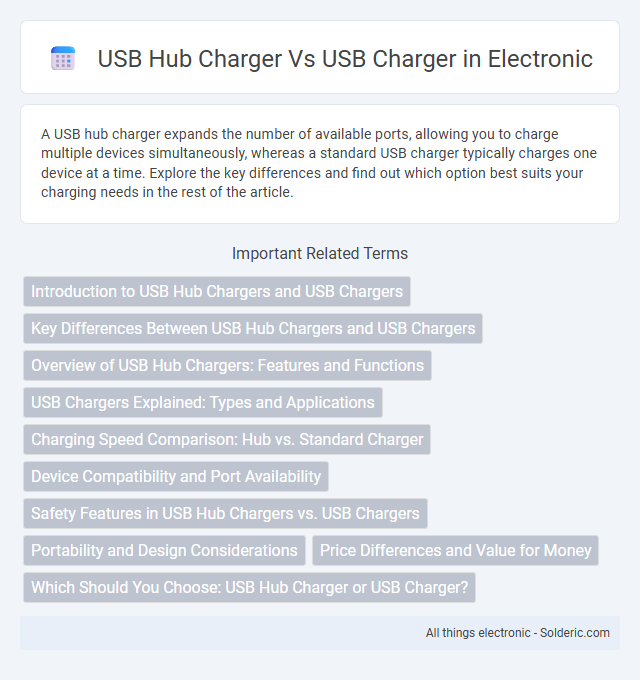A USB hub charger expands the number of available ports, allowing you to charge multiple devices simultaneously, whereas a standard USB charger typically charges one device at a time. Explore the key differences and find out which option best suits your charging needs in the rest of the article.
Comparison Table
| Feature | USB Hub Charger | USB Charger |
|---|---|---|
| Function | Charges devices and expands USB port availability | Charges devices only |
| Number of Ports | Multiple USB ports (usually 4+) | Single or few USB ports (1-3) |
| Power Delivery | Varies, may support fast charging on select ports | Typically optimized for fast charging |
| Data Transfer | Supports data transfer across multiple devices | No data transfer, charging only |
| Use Case | Ideal for connecting multiple USB devices, charging simultaneously | Best for dedicated fast charging |
| Price Range | Moderate to high | Low to moderate |
Introduction to USB Hub Chargers and USB Chargers
USB hub chargers expand your device connectivity by providing multiple USB ports for charging and data transfer, compared to standard USB chargers that typically offer a single charging port. These hubs enhance charging efficiency and organization, especially for users managing several devices simultaneously. Choosing between a USB hub charger and a USB charger depends on your specific needs for device power and data management.
Key Differences Between USB Hub Chargers and USB Chargers
USB hub chargers feature multiple ports that allow simultaneous charging and data transfer for several devices, whereas standard USB chargers typically provide power to a single device without data connectivity. USB hub chargers often support higher power output per port and enable device synchronization with connected computers, differentiating them from simple USB chargers designed solely for power delivery. The built-in intelligent charging technology in many USB hub chargers ensures optimal power distribution and device protection not commonly found in basic USB chargers.
Overview of USB Hub Chargers: Features and Functions
USB hub chargers combine multiple USB ports in a single device, enabling simultaneous charging of several devices while often incorporating data transfer capabilities. These chargers support various USB standards such as USB 3.0 or USB-C Power Delivery, providing faster charging speeds and compatibility with a range of smartphones, tablets, and laptops. Integrated safety features like over-current, over-voltage, and short-circuit protection ensure secure and efficient energy distribution across connected devices.
USB Chargers Explained: Types and Applications
USB chargers come in various types, including single-port chargers designed for individual devices and USB hub chargers that provide multiple ports to power several gadgets simultaneously. USB hub chargers are ideal for users who need to charge multiple devices efficiently, reducing clutter and optimizing power distribution with features like fast charging and intelligent power management. Understanding your charging needs ensures you select the right charger to maintain device performance and convenience.
Charging Speed Comparison: Hub vs. Standard Charger
A USB hub charger typically distributes power across multiple devices, resulting in slower charging speeds per device compared to a standard USB charger designed to deliver full output to a single device. Standard USB chargers often provide higher amperage, such as 2.4A or more per port, enabling faster charging for compatible smartphones and tablets. USB hub chargers are ideal for simultaneous multiple device connections but may reduce charging efficiency due to shared power delivery limitations.
Device Compatibility and Port Availability
USB hub chargers offer multiple ports that enable simultaneous charging of various devices, enhancing convenience when managing several USB-compatible gadgets. Standard USB chargers typically provide fewer ports, limiting the number of devices you can charge at once and potentially requiring multiple outlets. Your choice should consider the compatibility of your devices with the hub's ports and the total available ports to maximize charging efficiency.
Safety Features in USB Hub Chargers vs. USB Chargers
USB hub chargers typically incorporate advanced safety features such as over-current protection, over-voltage protection, short-circuit prevention, and temperature control to safeguard multiple connected devices simultaneously. USB chargers, designed primarily for single-device charging, may include basic safety mechanisms but often lack the comprehensive protections found in USB hub chargers. Enhanced safety protocols in USB hub chargers reduce the risk of electrical hazards and device damage when powering several gadgets at once.
Portability and Design Considerations
A USB hub charger integrates multiple ports into a single device, offering compact versatility for charging several gadgets simultaneously while maintaining a streamlined design ideal for travel and small workspaces. USB chargers typically feature one or two ports, emphasizing minimal size and lightweight construction for easy portability, but lack the expandability of hubs. Design considerations include power distribution efficiency and heat dissipation, with hub chargers often incorporating advanced circuitry to manage multiple devices without compromising size or safety.
Price Differences and Value for Money
USB charger prices are generally lower than USB hub chargers due to their single-port design and simpler functionality. USB hub chargers, while more expensive, offer multiple charging ports that justify the cost by enabling simultaneous device charging and reducing the need for multiple adapters. For users with multiple devices, investing in a USB hub charger provides better value for money through convenience and efficiency, despite the higher initial price.
Which Should You Choose: USB Hub Charger or USB Charger?
A USB hub charger offers multiple charging ports, ideal for users with several devices needing simultaneous power, while a single USB charger provides faster charging speeds for one device at a time. Choosing between them depends on your charging needs: prioritize a USB hub charger for convenience and device management or select a USB charger for optimal performance and quick charging. Consider the wattage and compatibility with your devices to ensure efficient power delivery and safety.
USB hub charger vs USB charger Infographic

 solderic.com
solderic.com